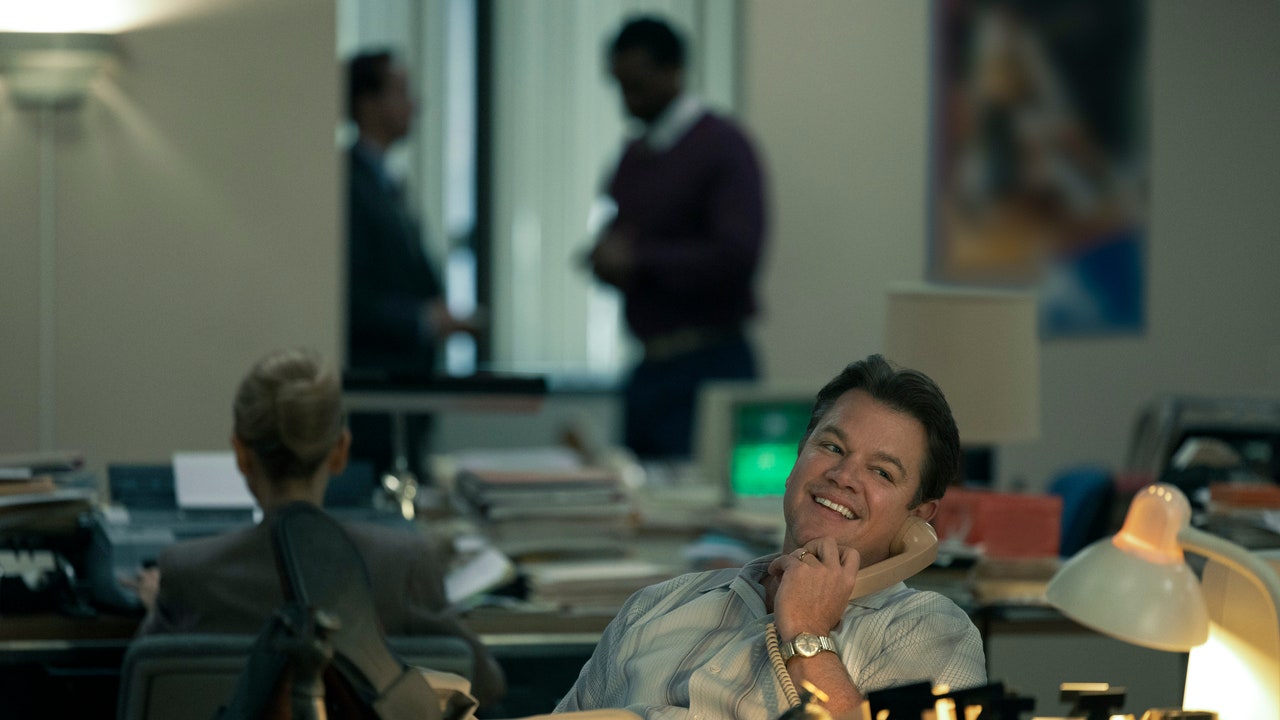When last we left Ben Affleck and Matt Damon, the just-outside-Boston buddies who won screenplay Oscars for Good Will Hunting a quarter-century ago, they were mired in the Middle Ages, telling a tale (that they had written, with Nicole Holofcener) of a mighty injustice. That film, The Last Duel, was an underappreciated curio, a strange and ultimately righteous movie that spoke to the present in olden terms.
The guys have left all that mud and difficulty behind for their latest outing together, Air (in theaters April 5), in which they both act, with Affleck directing. (They’ve handed the screenwriting duties to Alex Convery.) In this film, the first from Damon and Affleck’s Artists Equity production house, nothing is more important than a sneaker. The mission is to entertain, and maybe dimly inspire.
Damon plays Sonny Vaccaro, a marketing guy at Nike whose specialty was scouting up-and-coming basketball players for potential endorsement deals. It’s the drab early 1980s: a go-go time for many, but an era of difficulty for Nike, then a relatively fledging shoe company nipping at the heels of titans like Converse and Adidas. Vaccaro, played with weary decency by Damon, needs a big win, a talent to hook Nike’s fortunes to so that he, and the corporation, might thrive.
He finds that star in Michael Jordan, by some measure the greatest basketball player of all time. Air is about Vaccaro’s efforts to sign a young Jordan to Nike, creating the bestselling Air Jordan sneaker in the process. But Jordan is not really in the movie—we glimpse the back of an actor’s head and that’s pretty much it. Air instead focuses on Vaccarro and on Jordan’s shrewd parents, played by real-life Couple Viola Davis and Julius Tennon, inching their way toward a deal that would change their lives—and, perhaps, the life of the nation.
I’m joking about that last part, though I’m not sure the movie is. A curious weight hangs over these proceedings, an insistence that we are watching something significant when, again, this is all just about a sneaker and the making of lots of money. Affleck, in his competent and earnest direction, tries to whip up something meaningful from this story of contracts, and Damon works hard to sell it.
Here and there, they succeed. Air is smartly acted and agreeably paced, a drama of invention that warmly invites the audience into an interesting process. I’ve never once in my life found myself wondering how the Air Jordan came to be, and yet Air makes that origin story compelling enough. Damon, Davis, and Tennon are joined on their journey by a host of good company. There’s Affleck (as Nike exec Phil Knight); there’s the always-welcome Chris Messina; there’s invaluable New York theater mainstay Matthew Maher; and there’s even Chris Tucker, making a rare screen appearance. They all make a persuasive pitch, marketing their movie as something more than it is.
But the smallness of what’s being talked about here is inescapable. The movie treats Vaccaro and his cohort as if they are the rumpled-shirt heroes of Spotlight, dragging a crucial thing into being. They are all getting, to use reality-show parlance, the hero’s edit, bathed in a deeply credulous wash of sentiment. We are meant, I think, to feel stirrings of awe, beholding an act of creation that tells us something about our past and our present. But Affleck doesn’t successfully connect this specific financial windfall to some grander American idea. Between Air and the recently released Tetris, I am finding it hard to be moved by stories of lucrative business. Congrats, I guess?
The weird blunder of Air is Jordan’s invisibility. It’s been reported that Affleck did not want to make a Michael Jordan biopic, which is understandable; that would be an undertaking perhaps not best suited to Affleck. But Jordan’s absence from this film leaves a big, leaping void at the center. We’re forced to root for marketing executives instead of the phenomenon being marketed. Without its raison d’etre, there is not enough juice to sustain the film. It all feels a bit silly by the heartstring-tugging end.
There are some sinister notes in there, too. Is this really where we’ve found ourselves: trying to wring emotion out of simple, cynical tales of branding? Well, yes, of course that’s where we are, here at the end of everything. I suppose I’ll just have to brace myself for the uplifting movie about Britney Spears’s Pepsi campaign. Which, glum as I am to admit it, actually sounds kind of good.
